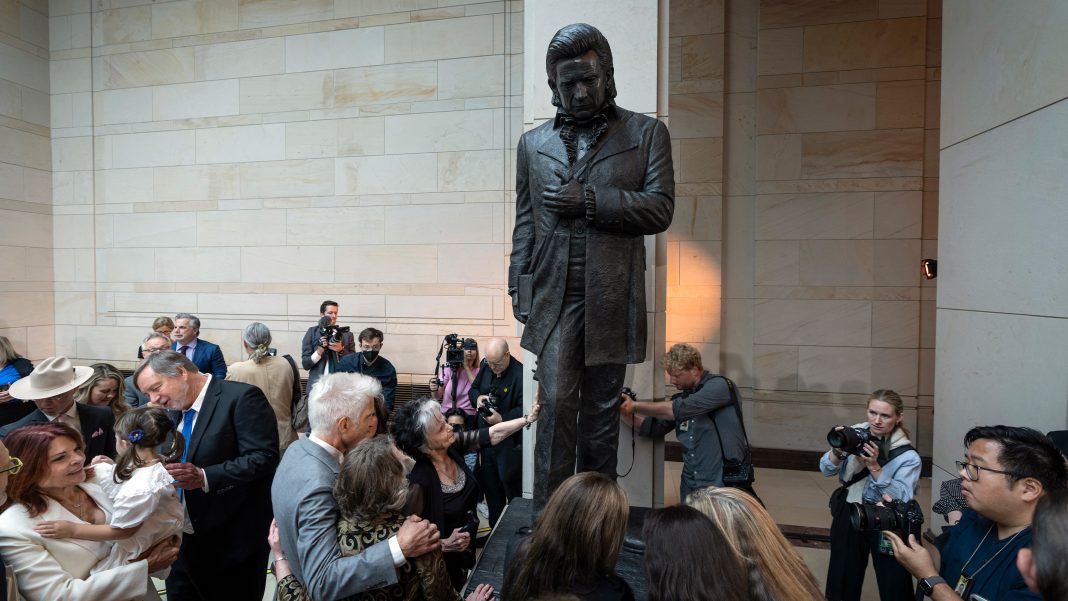On September 24, 2024, history was made in the U.S. Capitol, as Johnny Cash, an emblematic figure of American music and culture, was honored with a statue—the first professional musician to receive such a distinction. This unveiling ceremony in Emancipation Hall drew an array of attendees, including congressional leaders from both sides of the aisle and members of the Cash family, a testimony to the universal appeal of Cash’s legacy.
House Speaker Mike Johnson addressed the crowd, posing a question that many had likely pondered: “Why should a musician have a statue here in the halls of the great American republic?” His answer underscored the multifaceted nature of American identity, asserting that the nation is about more than just laws and politics. This sentiment resonates deeply, especially in an era where cultural figures often become beacons of hope and resilience.
The statue, crafted by Little Rock sculptor Kevin Kresse, portrays Cash in a contemplative pose, with a guitar slung over his back and a Bible held firmly in his hand. This imagery encapsulates his complex identity—an artist who seamlessly blended music with profound spirituality. As Arkansas Governor Sarah Huckabee Sanders remarked, Cash embodied authenticity in a world often plagued by superficiality. She reflected on her own upbringing, where Johnny Cash was revered as a cultural icon, second only to faith and patriotism.
The decision to honor Cash, alongside civil rights leader Daisy Bates, reflects a broader cultural shift in how we commemorate history. In 2019, Arkansas legislators voted to replace two lesser-known statues that had stood in the Capitol for over a century, recognizing the need to elevate figures who represent the state’s rich narrative of struggle and triumph. Bates, who mentored the nine Black children who desegregated Little Rock Central High School in 1957, stands alongside Cash, weaving together the threads of music and civil rights.
Cash’s impact on American music and culture is undeniable. With a career that spanned genres—from country to rock, blues, folk, and gospel—he sold over 90 million records worldwide. His songs, such as “I Walk The Line,” “Ring of Fire,” and “A Boy Named Sue,” not only entertained but also articulated the struggles and triumphs of everyday Americans. Democratic leader Hakeem Jeffries aptly noted Cash’s “substance” and “swagger,” emphasizing how his artistry inspired a multitude of musicians across diverse genres. In a lighthearted moment, Jeffries quoted rapper Snoop Dogg, who affectionately referred to Cash as a “real American gangster,” illustrating the broad respect Cash commanded.
Rosanne Cash, the singer’s daughter, poignantly shared that her father would have considered the statue the pinnacle of honor in his life. She reflected on how Cash’s difficult upbringing instilled in him a strong work ethic and a belief in the American dream as a refuge for all. “This man was a living redemption story,” she said, highlighting how he faced his demons with love and resilience. Cash’s struggles with addiction and his journey toward redemption resonate with many, serving as a reminder of the human capacity for change and growth.
Johnny Cash, who was born in Kingsland, Arkansas, and passed away in 2003 at the age of 71, is now immortalized in the halls of the Capitol—a fitting tribute to a man whose life and music transcended boundaries. His statue joins the ranks of other notable figures, including the recently unveiled statue of the Rev. Billy Graham, symbolizing a celebration of both artistic and moral contributions to American society.
As we reflect on this moment, it becomes clear that Johnny Cash’s legacy is not merely confined to his music. It embodies the essence of the American spirit—resilient, authentic, and transformative. His story continues to inspire generations, reminding us that in the tapestry of American history, music has the power to heal, unite, and uplift.

